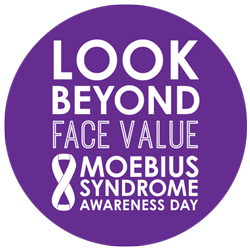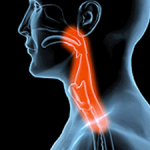So what is Moebius Syndrome?
Well according to The Many Faces of Moebius “Moebius Syndrome is an extremely rare congenital neurological disorder which is characterized by facial paralysis and the inability to move the eyes from side to side. Most people with Moebius Syndrome are born with complete facial paralysis and can’t close their eyes or show facial expressions. Limb and chest wall abnormalities often occur with the syndrome. Respiratory problems, speech and swallowing disorders, visual impairments, sensory integration dysfunction, sleep disorders and weak upper body strength may also be present.
People with Moebius Syndrome are of normal intelligence, although their lack of facial expression is often taken to be due to dullness or unfriendliness.
It is estimated that there are only between 5,000 to 10,000 cases of Moebius syndrome worldwide.
Last year’s Moebius Syndrome Awareness Day was a resounding success and saw participation from every continent on the planet – the main focus was to create awareness via the media, and dozens of news stories hit the headlines, wound up on the airwaves, and blasted off into cyberspace via various print, TV, radio and social media news publications!
Family, and the importance thereof in the lives of individuals who have Moebius syndrome is the focus of this year’s Awareness Day. “It is a tribute to the many families around the world who are often the unsung heroes of our lives” says Tim Smith, President of the Many Faces Of Moebius Syndrome, who himself has the condition.
“There is no substitute for a loving, supportive family whether that family is biological, or our worldwide Moebius Family. Knowing someone is there to support and fight for you when the going gets tough makes living with Moebius Syndrome a little easier” says Vicki McCarrell, President of the Moebius Syndrome Foundation.
Moebius Syndrome Awareness Day is held annually on the 24th of January, the birthdate of Professor Paul Julius Moebius, the doctor who first diagnosed the disorder in 1888.”

